Part Two of Three: Preventing a Pain Flare Before It Hits
This is a three-part series all about pain flares caused by chronic illness. (You can find links for the other two at the end of this post.) In this second part of the series, we share our best strategies to stop a pain flare from happening in the first place. These tips all come from real life, painful experiences; I hope that you find something useful to add to your own pain management toolkit.
And like how triggers vary for each individual, so do coping strategies. What helps one person may worsen another’s condition. For example, a bath may help me to unwind, but trigger a pain flare in someone else. The tricky thing about chronic illnesses are how individualistic they are. Even people suffering from the same illness can present vastly different symptoms, and use opposite strategies to cope! I would gently urge you to keep an open mind, and to only try out what feels comfortable and suitable for yourself.
My Best Tip for Preventing a Pain Flare Before It Happens is:
“Pacing myself, making sure if I know I’m having a busy weekend with a lot of activity I plan breaks in between so I can rest. Or, if I’ve had a hectic Saturday, I make sure I have nothing planned on the Sunday so I can just sit and watch telly/read a book which helps me recharge.”
– Abbey –
“Pain killers when I start feeling stiff, instead of when the pain sets in.”
– Sreetama –
“Regular self-care habits like daily meditations, gratitudes, and regular exercise.”
– Alison –
“Being aware of any busy periods coming up and planning how to effectively use and reserve my energy.”
– Rachel Hill –
” Breathing exercises, meditation, visualizing the situation I might be in that causes a flareup and talk myself through it before it happens.”
– Tom Seaman –
“If I want to do something, or I need to, I pace and take a lot of breaks. Pacing and moderation when I am fine and when I am not fine are fundamental. Some flares I cannot control, like weather though.”
– Nikki Albert –
“Pacing. It won’t prevent all flares but it will conserve my energy so that I’m less likely to flare from simply over-doing it.”
– Julie Ryan –
“Try to avoid stress as much as possible and don’t ever stress over things you have no control over. Remember self care is not a luxury, it’s essential to your whole wellbeing be it physical mental or emotional. Surround yourself with people who understand.”
– Candace –
“Pacing. Something I’m not very good at but I try my best anyway. I try to take regular rest breaks. I also plan my activities so they’re spread out over a few days, rather than all in one day.”
– Jo Moss –
“Be careful with your stretches and your work outs! Take things slow, and know your limits. There’s no shame to small, manageable exercises each day as opposed to big feats. What matters is that you include activity where you can!”
– Kyra –
“Trying not to overthink and removing negativity from my life (where possible).”
– Michelle –
“To manage my stress through meditation, yoga and talking to others. To also take time to do things I enjoy and try to remember that whatever it is that’s causing the stress, it’s not the end of the world.”
– Heather –
“Rest and eat very very simple foods. The kind of food that has practically no nutritional value.”
– Jenny –
“Ordinarily, it would be to pace yourself. However, the problem with this is, like the unpredictability of symptoms that we already live with, what we are able to do on any given day is just as unpredictable. My capabilities vary from day to day just as how I feel does. So perhaps my best tip would instead be to listen to my body and any signs that I am exceeding my personal limits.”
– Rhiann –
“I load up on Pred, but it doesn’t always work for me.”
– Lin Shuwen –
“Do not expect too much of yourself, give each day a realistic number of things to do.”
– Fibro Jedi –
“Keep moving, I must exercise every 3-4 days.”
– Jessica –
“There is often some detective work involved. Sometimes people keep a diary of their symptoms, and any events proceeded them, so they can work out what their triggers are. Once people have identified their own personal triggers, they do their best to avoid them! Treating chronic UTI is a long process. As an infections is slowly brought under control, people find they have less problems with flare ups and no longer have to avoid the triggers.”
– Chronic UTI Australia –
“Meditate, stay grounded, pray. Eat and sleep well. Take your supplements and medications on time. Stay active and workout no matter what that is.”
– Effie –
“I carry a Respro filtrating mask with me when I go out in public and put it on if I am in an area where I’m likely to get exposed. I also limit my trips to places where I’m likely to get exposed, and of course my home is a fragrance-free sanctuary. I carry a small bottle of hand soap in my purse to avoid the chemical-laden public restroom soaps.”
– Sara Russell –
“Pacing and management are key to avoiding flare-ups. It is crucial to my lifestyle, and without some sort of plan in place for each day, my life can quickly spiral out of control. Every single chronically ill person knows the importance of pacing, and they also know the importance of saying no and setting boundaries.”
– Carrie Kellenberger –
“Being aware of my sustainable baseline of activity, being aware of the messages from my body and whether I’m having a good, bad or average energy day and aiming to approach everything I do with an attitude of mindful relaxed effortlessness.”
– Julie Holliday –
“I wait days between bathing – most commonly a whole week, but when I was less severely ill I would skip just three days as my worst flare symptoms arrive 48 hours after the exertion (I call it ‘Day 2’) and then on the third day I felt better and could do it all over again.
On the day of my bath or seated shower I will stay in bed all morning and not plan any other activities. I also make sure that I have no upcoming events or visits for the few days after because I know that I will have to stay in bed and very likely in the dark for a few days.”
– Chronically Hopeful Char –
“Resting enough before and after an activity, clearing my mind with off-screen activities; going out, even if it’s just for a short walk, doing stretch exercises or gentle yoga, playing with my dog.”
– Kirsten –
“Use a piece of jewellery to fidget with, gets rid of anxious energy, and also works as a talisman if I have a flashback that keeps me in the present.”
– Em –
“Pacing! In time we all learn our limits, and if you can keep an eye on how much you’ve done, physically and mentally you can help avoid ending up in flaring situations. Once you push and take your body over the edge, it’ll be a while until you’re able to function again. Be kind and mix doing things with breaks and self care.”
– Ruthy –
“Cbd oil & vitamin d helps but nothing really prevents.”
– Alice hightower –
“Because my flare ups are usually triggered by emotional stress, I try and prevent and deal with it as much as possible by carrying out activities such as yoga and meditation. I find that these help to calm my mind, so I can cope better with with any problems that arise.”
– Jenny Clarkson –
“So much water and Nuun. Taking my pain killers before I satrt and having voodoo tape on hand to wrap up the dislocation. I also time all of my activities so physical tasks are followed by still tasks and I use an app called fabulous to keep me on track.”
– Monica Laipple –
“Good self care: daily walks, go to bed early, eat right, b vitamins and magnesium.”
– Amanda Malachesky –
“My best tips for preventing flares is drinking plenty of water and taking inventory of my thoughts. Staying positive and hydrated really lessen the intensity for me.”
– Audrey Housworth –
“Continuous hormone medications, if tolerated, to suppress hormone fluctuations.”
– Hell’s Bells and Mast Cells –
“I have to take time every day for meditation, yoga and stretches to relax my muscles, and getting enough rest and sleep.”
– Lynn Clark –
iamlynnclark.com
“Pacing before it happens – being the most rested possible to limit it’s affect.”
– Taylor –
“Pacing myself and allowing enough rest time between activities.”
– Pamela Jessen –
“It isn’t always possible to avoid stressors, but I try to squeeze in some rest time, and make that a priority above all else. Even a short nap can make a noticeable difference in pain levels.
If the flare is starting to increase in intensity, I take one of my anti-anxiety medications which help me to sleep better. This has actually been a big game changer for me – I’m not a good sleeper, and you have no idea how much a quality night of sleep can help a person with chronic illness!”
– Sheryl –
Thank you to everyone who contributed to this roundup! Keep an eye open for part three, where we’ll share methods of coping with pain flares if they, unfortunately, happen anyway.
The article is based on each individual’s own experiences, and nothing should be taken as medical advice. Always be sure to check with your doctor before you start on any new treatment or protocol, whatever that may be.
If you liked this article, sign up for our mailing list here so you don’t miss out on our latest posts! You will also receive an e-book full of uplifting messages, quotes and illustrations, as a token of appreciation!
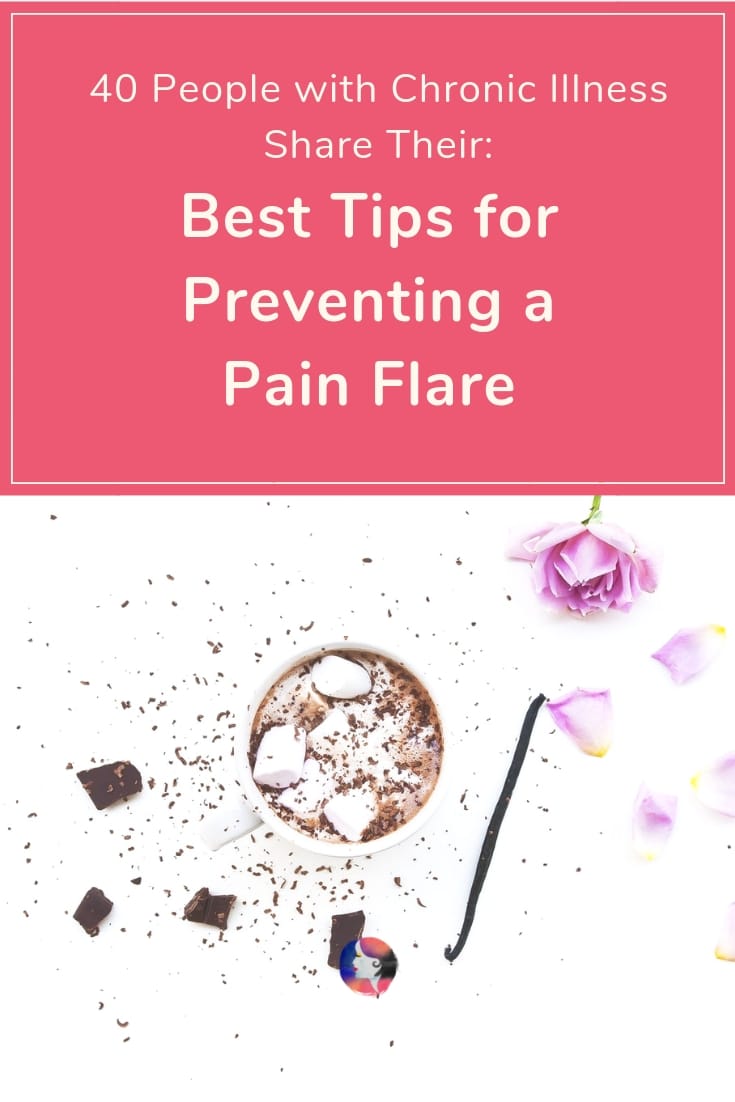
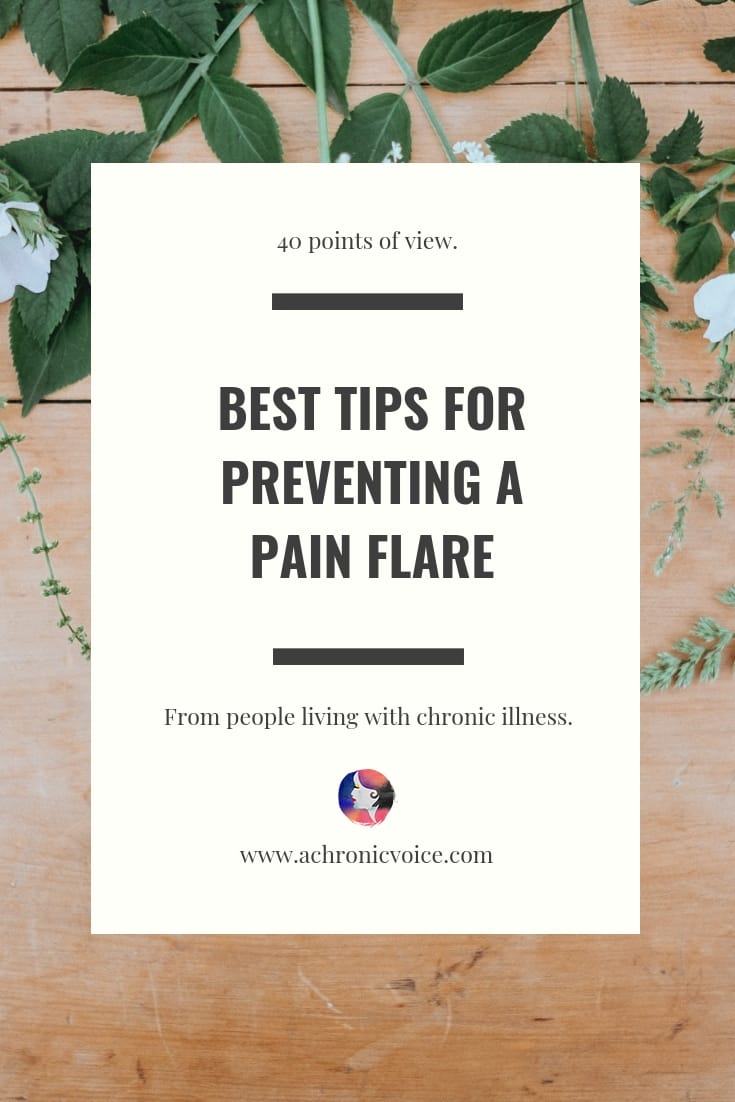
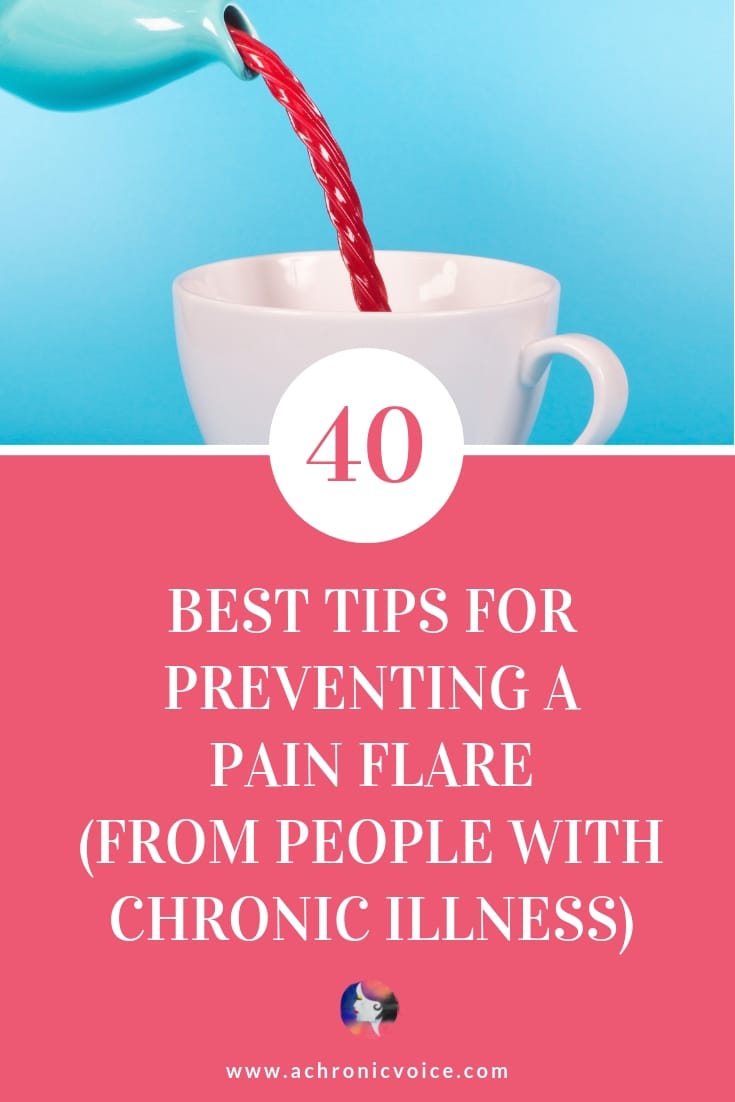

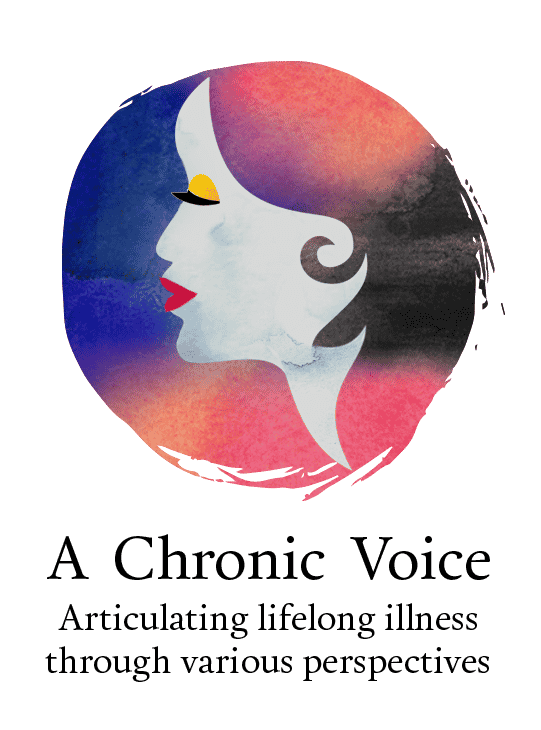
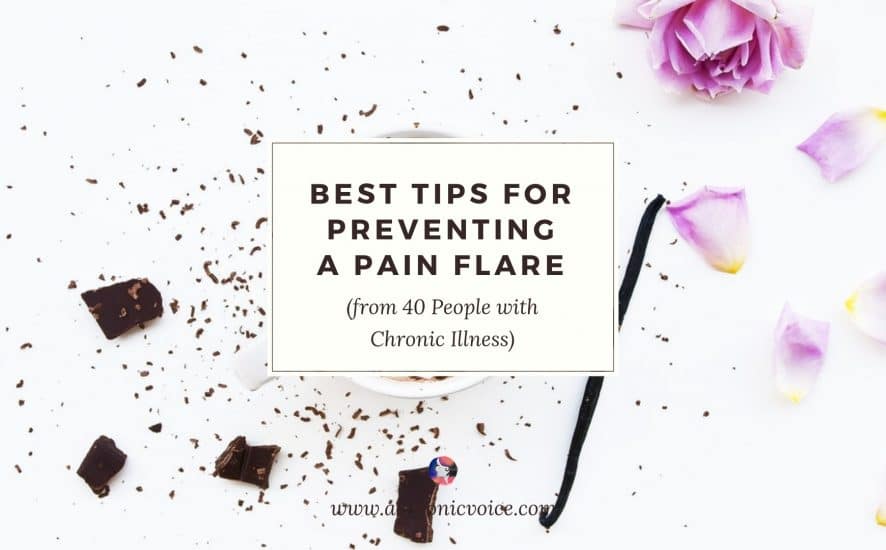
Thank you for putting this post together and collecting so many people’s useful advice. It’s always great to be introduced to new ideas and strategies we can put in our tool kit to help manage our conditions. Preventing flares from happening in the first place really helps me make more progress in the long term.
Thank you so much for your support Lucy! If you have more tips to add in, let me know. I’ll be happy to update this as chronic pain is neverending and the more tips and tools to try, the better!
A few people mentioned pacing and as I’ve gotten better at it (although in phases, but longer ones now), I do see a difference in the regularity and intensity of the worst of flares.
Yes pacing is soooo important and also….soooo hard. For me at least haha. I really need to dig my heels harder into practising it. 🙂
I sure appreciate all these tried and true strategies from so many! For me, lately, meditation (especially outside) is helping. But also, I’m experiencing way less pain most days due to my new regiment of Low Dose Naltrexone (LDN). I’ve been on it 100 days now. Started at 0.25mg and am now titrated to 3.75mg. It sure is helping with FM symptoms.
I’m so happy that the LDN treatment is working for you, and also the meditation. Every little bit of coping strategy and pain management tool helps, I’d say. Sending love!
It’s always helpful to know how other people cope. Learning how our own bodies can react to different things really can help. Although, sometimes they just throw curveballs at us. Great post – thanks for sharing.
Thanks Elizabeth. I agree, learning about our bodies is so important for pacing and pain management. I thought these were some great tips from others with chronic illness and pain!
What a great resource to share tips from so many others which will hopefully help.
Hi Rachael, yes that was the aim! 😀
Lots of great tips curated here! 🙂 We can sure learn from each other to try and prevent as many flare ups in future.
Thanks for contributing to this too, Rachel! You’re so right, it’s great we can learn from each other 🙂